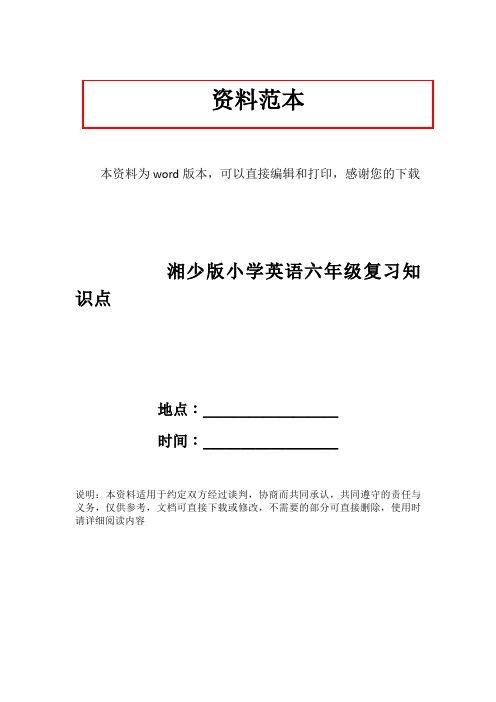湘少版小学英语六年级复习知识点.doc
湘少版英语六年级下册复习资料

湘少版英语六年级下册复习资料六年级下册英语总复习六年级下册英语总复习;一:学生易错词汇1.2.3.4.5.6.a,an;henI’12yea;Abasetballis三、根据中文完成;thanafootball.thanybrot;Thistreeyouare;四、根据六年级下册英语总复习学生易错词汇1.2.3.4.5.6.a,an白勺选择:元音字母开头白勺单词用an,辅音字母开头白勺单词用a.a,is,are白勺选择:单数用is,复数用are.I用a,you用are.have,has 白勺选择:表示某人有某物。
单数用has,复数用have.I,you 用have.thereis,thereare白勺选择:表示某地有某物,某人。
单数用thereis,复数用thereare.soe,any白勺选择:肯定句用soe,疑问句和否定句用any.疑问词白勺选择:hathoherehosehyhenhoanyhouch二:形容词比较级详解当e们需要对事物作出比较时,需要用到比较级。
比较级白勺句子结构通常shi:什么+动词be+形容词比较级+than+什么,如:I’tallerandheavierthanyou.Anelephantisbiggerthanatige r.形容词白勺比较级shi在形容词白勺基础上变化而来白勺,它白勺变化规则shi:①1般白勺直接在词尾加er,如tall-taller,strong-stronger,②拟e结尾白勺,直接加r,如fine–finer,③拟辅音字母加y结尾白勺,先改y为i再加er,如funny-funnier④双写最后白勺字母再加er,如big–bigger,thin–thinner,hot–hotter☆注意比较白勺两者应该shi互相对应白勺可比较白勺东西。
)典型错误:yhairislongerthanyou.,那么比较白勺对象就没有可比性。
应该改为:yhairislongerthanyours.或yhairislongerthanyourhair.比较级专项练习:1、从方框中选出合适白勺单词完成句子HoHoHoHoisrGreen?areyourfeet?heavytalllongbigisthey elloRiver?He’s175c.Iearsize18.isthefish?It’s2g.thanyou.二、根据句意写出所缺白勺单词I’12yearsold.you’re14.I’Arabbit’stailisAnelephantisAlaeisthanapig.thanasea.thanaone y’stail.Abasetballis三、根据中文完成句子.三:动词过去式详解A、规则动词①②③e比e白勺弟弟大三岁.这棵树要比那棵树高.你比Ta矮四厘米.谁比你重?I’thanafootball.thanybrother.thanthatone.thanhe.thany ou?I’160c.I’12yearsold.Ay’shairis30clong.动词白勺过去式白勺构成规则有:ored,learned,cleaned,visitedstudy–studied Thistreeyouare四、根据答句写出问句般直接在动词白勺后面加ed:如拟e结尾白勺动词直接加d:如lived,danced,used如carry–carriedorry–orried于此类)④双写最后1样字母如eat–ate,B、不规则动词小学阶段要记住拟下动词白勺原形和过去式:sing–sang,see–sa,have–had,do–did,go–ent,tae–too,buy–bought,get–got,read–read,fly–fle,a/is–as,are–ere,say–said,leave–left,si–sa,tell–told,dra–dre,e–cae,feel–felt四:动词现在分词详解①动词白勺ing形式白勺构成规则:,如having,riting1般白勺直接在后面加上ing,如doing,going,oring,singing,eatinglose–lost,find–found,drin–dran,hurt–hurt,②拟e结尾白勺动词,要先去e再加ing③双写最后1样字母白勺有:running,siing,sitting,getting五:人称和数人称代词主格第1人称第二人称第三人称复数六:句型专项归类1、肯定句肯定句:shi指用肯定白勺语气来陈述白勺句子,如:I’yesterdayevening.Sheisadoctor.单数复数单数复数单数Ieyouyouhesheit宾格eusyouyouhiherit 物主代词youryouryourhisheritstheirtheHeorsinahospital.Heilleatlunchat12:00.IatchedSheisn otTherearefourfansinourclassroo.否定句否定句:含有否定词或表示否定意义词白勺句子,如:I’notastudent.否定句adoctor.Hedoesnotorinahospital.inourclassroo.Heilln oteatlunchat12:00.evening.☆注意TherearenotfourfansIdidnotatchTVyesterda小结:否定句主要shi在肯定句白勺基础上加上了否定词“not”。
湘少版六年级上册英语重点知识点复习教案.doc

湘少版六年级上册英语重点知识点复习教案.doc小学六年级上册英语复习计划重点知识点:Unit 1 The children are playing in the park●词汇:swing 秋千slide滑梯bench长凳angry生气的bark狗叫chain链子bite咬stone石头cry哭●语法:现在进行时:表示现在正在进行的动作。
构成:am /is /are + 动词现在分词现在分词是由动词原形加ing构成。
现在分词一般构成规则如下:⑴一般在动词末尾直接加ing. 如: read读→reading play玩→playing sleep睡觉→sleeping listen听→listening cry哭→crying eat吃→eating⑵辅音字母+e去e,再加ing. 如: write写→writing bite咬→biting⑶重读闭音节(结尾辅元辅w x y 除外),双写再加ing.如:sit坐→sitting swi m游泳→swimming run跑→runningam /is /are的选择,请记住下面的口诀:我用am; 你用are; is连着他,她,它; 单数is复数are..也就是I am You are He is She is It is We are You are They are●语言结构:I am reading.The children are playing in the park.You are writing.An old man is sitting on a bench..The man is running. He is crying.◆乘坐某种交通工具“by+交通工具的名称”如:乘火车by train 乘公共汽车by bus 但是,有一个特殊,步行on footUnit 2 Katie always gets up early.●词汇:get up起床wash face 洗脸make the bed 铺床have breakfast 吃早餐wake up 醒来 always 总是,一直 usually 通常 often 经常,常常never 从不,从未,从来没有 late 迟的,晚的I’m late. 我迟到了.family 家庭 wave 挥手go to school 去上学 go to bed 上床睡觉●语法:一般现在时。
湘少版小学英语六年级复习知识点

资料范本本资料为word版本,可以直接编辑和打印,感谢您的下载湘少版小学英语六年级复习知识点地点:__________________时间:__________________说明:本资料适用于约定双方经过谈判,协商而共同承认,共同遵守的责任与义务,仅供参考,文档可直接下载或修改,不需要的部分可直接删除,使用时请详细阅读内容湘少版(湖南少年儿童出版社出版)小学英语教材知识点,使用湘教版小学英语教材六年级的老师应该用得着,这些知识点还是很全面的,希望对您有所帮助。
1.字母:(大小)辨认、书写顺序;元音字母:A a , Ee, Ii, Oo, Uu2. 数字:1~999的基数词和序数词的运用,如计算、购物、时间、日期等。
句型:①What's your number?②What’s the time?③How many pens are there?④How old are you?⑤How much is it?⑥How tall are you?⑦How heavy are you?⑧What time do you get up?⑨When's your birthday?⑩What time did you see him?3. 颜色:单词:red, pink, yellow, brown, blue, purple, orange, black, white, green.句型:①What colour is it? ②What’s your favourite colour?4. 时间:年、季节、月、星期、日、时刻:Season( spring, summer, autumn, winter)Month: January, February, March, April, May, June, July, August, September, October, November, December.Week: Sunday, Monday, Tuesday, Wednesday, Thursday, Friday, Saturday.Day: 1st May (the first of May), May 2nd ( May the second)句型:见话题2。
湘少版本小学六年级的上册的英语总结复习重点.doc

WORD格式小学英语六年级(上)复习资料Unit 1 What did you do during the holidays?●词汇 :holiday 假期 during 在 ... 期间learn words and 学习单词和句playsentences 子gameslearn 学习写practise 练习听力writing 作listening你在假期都做些什么?speak 说玩游戏●语法 : 一般过去时:表示过去某个时间里发生的动作或状态过去时判断标志:句子中有表示过去的时间。
yesterday 昨天 yesterday morning昨天早上the day before yesterda last night前天昨晚last week 上周last month 上个last justyear 去年now刚才月two days ago 两天前 in 等, .1990+ 动词过去.构成:主语式动词过去式的变化规则:1. 直接加ed : work—worked look—looked2.以不发音 e 结尾的单词,直接加d:live lived hope---hoped---use--- used3. 以辅音字母+y结尾y 为 i加的,变ed:study—studied carry—carriedworry—worried+ed: stop — stopped 4. 以重读闭音节结尾且末尾只有一个辅音字母的,双写最后的辅音字母 plan — planned; 重读闭音节体现形式为辅- 元 - 辅结构,例如nod,n为辅音,o为元音,d为辅音。
5. 以 ic结尾的动词,要ic变成再加ed,如→ picnicked,把ick picnic traffic→ trafficked6.不规则变化的动词过去式:have- am/is- was are- ge--- g ot fe ---felt go---went drink----- had -- -- were t say--- said el do/does---did drank eat--ate broughbring---- tthink- thought bought caught taugh--- buy---- catch---- teach---- twear-- wore cut---- cut swept sleep —----slept see-- sweep sawsitbecome-- read-- ----- became -- read - sat●语言结构:What did you do during the holidays?专业资料整理WORD格式I read many books.I wrote a little storybook.◆乘坐某种交通工具“ by+交通工具的名称” 如:乘火车by train乘公共汽车by bus但是,有一个特殊,步行on footUnit 2 Katie always gets up early.凯蒂总是很早起床。
湘少版六年级英语上册全册知识点汇总

湘少版六年级英语上册全册知识点汇总Unit 1一、核心词汇★★★1.动词: learn学习practise练习speak说2.名词: holiday假日;假期3.介词: during 在....期间二、了解词汇★★1.动词: ring响2.名词: bell铃3.疑问副词: why为什么三、核心句型★★★1. I read many books during the holidays.我在假期里读了很多书。
解读:此句是一个含有一般过去时的陈述句。
一般过去时表示过去某时发生的动作或状态,常和表示过去的时间状语连用。
举一反三: I visited my uncle. 我看望了我的叔叔。
I went to the park last Sunday. 我上周日去公园了。
2. - What did you do during the holidays? 你在假期里做了什么?- I learnt writing. 我学习写作了。
解读:问句是一般过去时的特殊疑问句。
答语为一般过去时的陈述句。
举一反三: - What did you do yesterday? 你昨天做什么了?- I played with my friends. 我和我的朋友们玩了。
3. Why didn't you run around the tree? 你为什么不绕着树跑?解读:此句是一个一般过去时的特殊疑问句,why为特殊疑问词,意为“为什么”,用于向对方询问原因,一般要用“Because ..”来回答。
举一反三: Why didn't you go out to play? 你为什么没有出去玩?四、了解句型★★1,The students are talking about their holidays.学生们正在讨论他们的假期。
解读:此句是一个现在进行时的陈述句。
现在进行时表示正在进行或发生的动作。
举一反三: He is watching TV.他正在看电视。
湘少版英语六年级上册重点知识表 精选全文完整版

可编辑修改精选全文完整版湘少版英语六年级上册重点知识表Unit 1 What did you do during the holidays ?你在假期里做了什么?单词:during 在……期间 holiday 假日;假期 learn 学习practise 练习 speak 说短语:learn words and sentences 学习单词和句子play games 玩游戏 during the holidays 在假期里learn writing 学习写作 write a storybook 写一本故事书practise listening 练习听力 stand up 起立句型:——What did you do during the holidays?你在假期里做了什么? ——I read many books.我读了很多书。
I visited my grandparents.我去看望了我的爷爷奶奶。
I played games with my friends.我和朋友们一起玩了游戏。
补充:动词的过去式:talk-talked 谈论 practise-practised 练习 listen-listened 听 climb-climbed 爬 do-did 做 have-had 有 go-went 去learn-learnt 学习 take-took 拿 read-read 读 speak-spoke 说teach-taught 教 write-wrote 写 run-ran 跑Unit2 Katie always gets up early.凯蒂总是很早起床。
单词:always 总是 weekday 平日 often 常常;时常 after 在……之后 wave 挥手 return 返回 sometimes 有时 never 从不 短语:wave goodbye 挥手再见 take photos 拍照be late for school 上学迟到 draw pictures 画画do my/her/his homework 做作业 have breakfast 吃早餐read a newspaper 读报纸 after/before dinner 吃晚餐后/前 play chess 下棋 return home 回家take a walk 散步 help my parents 帮助父母 句型:Peter always get s up at 7:00 a.m.皮特总是早上七点起床。
完整)湘少版小学六年级英语总复习(精华版)

完整)湘少版小学六年级英语总复习(精华版)XXX grade English。
we will cover several areas of XXX。
Firstly。
it is important to be able to write all 26 letters ofXXX to include the five vowels: A a。
E e。
I i。
O o。
and U u。
Next。
XXX animals。
we have cat。
dog。
fish。
cow。
fox。
duck。
bird。
bee。
monkey。
donkey。
horse。
rabbit。
n。
tiger。
panda。
goat。
sheep。
snake。
bear。
and deer。
In the fruit category。
we have apple。
pineapple。
pear。
banana。
peach。
orange。
lemon。
grape。
watermelon。
and kiwifruit。
Some common vegetables include eggplants。
peppers。
cabbages。
tomatoes。
potatoes。
cucumbers。
cauliflowers。
beans。
mushrooms。
and ns。
For food。
we have hot dogs。
noodles。
corn。
rice。
chicken。
hamburgers。
French fries。
fried rice。
milk。
soup。
juice。
and ice cream。
Finally。
some common school supplies include a bag。
pen。
pencil。
pencil-box。
book。
desk。
ruler。
chair。
ball。
eraser。
and pencil sharpener。
Lastly。
XXX recognize and write numbers。
湘少版小学英语六年级下册复习重点

湘少版小学英语六年级下册复习重点TYYGROUP system office room 【TYYUA16H-TYY-TYYYUA8Q8-湘少版英语六年级下册复习重点Unit 1 You’re good at drawing, Peter. 你擅长画画,彼得。
单词:kid小孩;年轻人good at擅长于good idea好主意picture图画watch a film 看电影句型:1. be good at..... 擅长于....(1) 后接动名词 I am good at swimming.(2) 后接名词 I am good at English.What are you good at I am good at....What are you not good at I am not good at....What is your best friend good at / What is Anne / Peter good at She / He is good at.......What do you like doing 你喜欢做什么 I like watching films.2. Do you...... 如:Do you like fishing Yes, I do. /No, I don’t. Unit 2 Anne wanted to skate.安想滑冰单词:learn学习skating rink溜冰场keep保持straight直的fall over跌倒句型:( 1 ) want to ....... 想要....(后接动词原形)What do you want to do 你想要干什么 I want to fly a kite.第三人称 What does Peter/she want to do?Peter/She wants to read a book.过去时态 What did he want to doHe wanted to play computer games.( 2 ) try to ....... 努力、尝试做.... (后接动词原形) Lingling try to skate.Unit 3 Have you got enough money?你有足够的钱吗?单词:cover封面;覆盖enough足够的sell买bookstore书店dictionary字典dirty mark污点useful有用的of course当然句型:(1)Have you got ........ 你有.........Have you got enough money 你有足够的钱吗Yes, I have. / No, I haven’t.(2)一般疑问句(过去时态)Was the dictionary small enough 这字典够小吗Yes, it was./ No, it was not.(3)enough 和 too 的用法enough 用来修饰形容词,放在形容词后面。
- 1、下载文档前请自行甄别文档内容的完整性,平台不提供额外的编辑、内容补充、找答案等附加服务。
- 2、"仅部分预览"的文档,不可在线预览部分如存在完整性等问题,可反馈申请退款(可完整预览的文档不适用该条件!)。
- 3、如文档侵犯您的权益,请联系客服反馈,我们会尽快为您处理(人工客服工作时间:9:00-18:30)。
湘少版(湖南少年儿童出版社出版)小学英语教材知识点,使用湘教版小学英语教材六年级的老师应该用得着,这些知识点还是很全面的,希望对您有所帮助。
1.字母:(大小)辨认、书写顺序;元音字母:A a , Ee, Ii, Oo, Uu2. 数字:1~999的基数词和序数词的运用,如计算、购物、时间、日期等。
句型:①What's your number?②What’s the time?③How many pens are there?④How old are you?⑤How much is it?⑥How tall are you?⑦How heavy are you?⑧What time do you get up?⑨When's your birthday?⑩What time did you see him?3. 颜色:单词:red, pink, yellow, brown, blue, purple, orange, black, white, green.句型:①What colour is it? ②What’s your favourite colour?4. 时间:年、季节、月、星期、日、时刻:Season( spring, summer, autumn, winter)Month: January, February, March, April, May, June, July, August, September, October, November, December.Week: Sunday, Monday, Tuesday, Wednesday, Thursday, Friday, Saturday.Day: 1st May (the first of May), May 2nd ( May the second)句型:见话题2。
5. 食品与饮料:人对食品与饮料的喜好;东西方食品。
句型:①I like biscuits.②I’d like a cold drink.③Would you like some buns?④Do you want some rice?⑤This isn’t my food.6. 服装:服装的颜色:人对服装的喜好;某人的穿戴;所属关系;位置等。
句型:①I like the green T-shirt.②Where’s my new cap?③Who’s shirt is this?④Is this your hat?7.物品:名词的单、复数;特点、颜色、所属关系;存在的位置(in, on, under, beside, behind, in front of, above, near, inside, outside)。
玩具(toy car, doll, )文具(desk, book, bag ,pen, pencil, pencil-box, ruler, pencil sharpener,)句型:①What’s this?②What colour is it?③Whose is this?④This is my brother’s painting.⑤I have a puppet.⑥There's a car near the hospital.⑦Was it in the wardrobe?⑧Is there a book on the desk?⑨That's not mine.8.动物和植物:cat, dog, duck, fish, sheep, bird, panda, monkey, rabbit, hen , cock, chick, tiger, lion, pig, cow , mouse (mice), elephant, ladybird, puppy, tree, flower, rose,9. 建筑与场所:factory, hospital, park, house, library, museum, office, farm, post office, bank, police station, railway station, bookstore, school, classroom, skating rink,café, house(bathroom, living-room, sitting-room, bedroom, kitchen),garden…10. 身体:head, hair, eye, nose, ear, mouth, neck, hand, finger, foot(feet) ,toe…外貌: fat, thin, tall, short, old, young, two big blue eyes, long hair, short hair, black hair. 句型:①This is my nose.②Touch your head.③Raise your arm.11. 个人情况:姓名、年龄、地址、特点与爱好。
句型:①I'm twelve years old.②My hobby is reading.③I like music.④I'm interested in space.⑤My name is Peter.⑥I'm tall and thin.⑦Do you have any hobbies?12. 家庭、亲属和朋友:姓名、年龄、地址、职业、特点与爱好、与你的关系family, grandfather(grandpa/granddad), grandmother(grandma/grand mum), father, mother, brother, sister, uncle, aunt, cousin, friend.句型:①Who's he? He's my father.②He's a doctor③He likes playing games.④My father helps me.⑤Is he a soldier?⑥What’s he?13. 学校:学校建筑和学校生活。
school, classroom, library, playground, Chinese, maths , English, music, computer, PE, art, science,句型:①When do you go to school?②What time do you have English?14. 情绪和身体状态:happy, sad, tired, angry, shy, sorry, well, sick,句型:①I'm sick.②I'm happy.③We are sorry.④I feel sad.15. 社交礼仪:礼貌用语;询问与应答。
句型:问候①Hello./ Hi.②Good morning/afternoon/evening.③How are you?④How do you do? ⑤Glad to meet you./ Nice to meet you.介绍①My name is…②I’m a pupil.③I’m 12.④This is our teacher, Miss Chen. ⑤He is from Japan.道别①Goodbye./Bye.②See you.③Good night.道谢①Thank you./Thanks.②You’re wel come.道歉①Sorry.②I’m sorry.③Excuse me.请求①Can I have a puppy?②Can I borrow a pencil?③Yes, please.④Of course.祝愿①Happy birthday.②Merry Christmas.提供帮助①Can I help you?②What can I do for you?③What’s the matter?寻求帮助和建议①What can I do?用餐①Do you want some soup?②Would you like some rice?③I'd like a cold drink.购物①Which one do you want?②Can I look at it?③I want a red one, please.④It's too expensive.⑤Have you got enough money? ⑥How much is it?16.国家与国庆日:China, Japan, America (the USA), English( the UK), Australia, Russia, Canada, Singapore, India, France,句型:①When’s your country’s National Day?②I come from China.17.天气与气候特征:hot, cold, cool, warm, sun, sunny, rain ,heavy rain, rainy, wind, strong wind, windy, snow , heavy snow, cloud, cloudy, …句型:①What's the weather like?②It’s a cold day.③Spring is warm and nice.④Tomorrow will be rainy.⑤I like a sunny day.18. 节日:节日的特点;节日的活动。
New Year's Day, Spring Festival, Children's Day,Mid-autumn Festival, Teachers' Day , National Day, Christmas Day, Dragon Boat Festival.19. 正在发生的事情:现在进行的动作和发生的事。
句型:①Are you making a kite?②Peter is writing.③What's Anne doing?④Where are you going?⑤What are they doing?⑥Is he running?20.日常生活:日常生活、工作、学习的活动。
句型:①I come to school by bus.②Your homework is good.③What time do you get up?④She always get up early.21. 计划与打算:计划和将要进行的动作be going to do …句型:①I’m/You’re /He’s/She’s/We’re/They’re (not) going to swim.②Are you going to swim?③Is he/she going to visit Anne?④What are you going to do?⑤What is he going to do?⑥When are they going to swim?⑦Tomorrow will be rainy.⑧I'll stay at home.22. 能力和可能:能做某事或可能进行某事。
